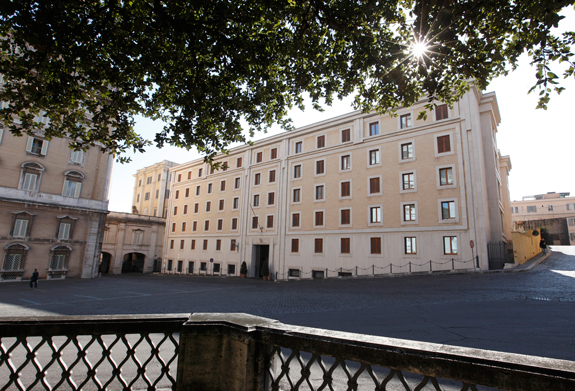by Cindy Wooden

VATICAN CITY (CNS) – For a Catholic so aware of the importance of tradition, even traditions with a small “t,” Pope Benedict XVI had to know he was setting a precedent by resigning.
“This development will offer options that maybe were not too obvious before this courageous decision of Pope Benedict,” said U.S. Cardinal Edwin F. O’Brien, grand master of the Equestrian Order of the Holy Sepulchre of Jerusalem.
Meeting the press in Boston, the city’s Cardinal Sean P. O’Malley agreed, saying the pope’s decision “will obviously have an effect going forward.”
Understanding Reception
Pope Benedict described his decision to be the first pope to resign in almost 600 years as the result of intense prayer and an examination of his conscience before God. Once in six centuries does not set a rule, but the understanding reception that the pope’s decision has received within the Church suggests that it will not be another 600 years before it happens again.
As head of a spiritual community that now numbers about 1.2 billion members all over the world, the pope did not approach the decision as a secular leader would. While he obviously talked to a few people about it, the 85-year-old pope described it as a matter of personal conscience, which implies he may have discussed it with a trusted spiritual guide, but did not seek broad consultation or a consensus.
Even though Pope Benedict and his older brother, Msgr. Georg Ratzinger, are very close, the elder Ratzinger told reporters at a news conference Feb. 11 he was “very surprised” by his brother’s decision but understood why he did it.
Confirming what the Vatican press spokesman had said, Msgr. Ratzinger told the British Broadcasting Corp. that his brother had been considering stepping down for months; he also told the BBC that the pope’s doctor had advised him not to take any more trans-Atlantic trips.
“When he got to the second half of his 80s, he felt that his age was showing and that he was gradually losing the abilities he may have had and that it takes to fulfill this office properly,” Msgr. Ratzinger told the BBC.
In prayer before God, Pope Benedict had to face important conflicting values: the tradition of a pope serving until death; the faith statement – often repeated by Blessed John Paul II – that God would relieve a pope from office when it was time, meaning the pope would die; and the practical energy needed to minister to a far-flung flock in an age of instant communication where events hit the Internet before any considered, prudent response can be formulated.
An ecumenical partner and esteemed theological colleague of Pope Benedict’s said he was not totally surprised by the pope’s decision. Anglican Bishop Rowan Williams, who stepped down in late December as the archbishop of Canterbury and head of the worldwide Anglican Communion, told Vatican Radio he and Pope Benedict spoke last March about the possibility of being able to retire.
